|
The Personality &
Temperament of
English Cockers:
Is this The Right Dog For You?
|
If you've been researching dog breeds and wondering if
the English Cocker will fit into your family and lifestyle, this
is the place to find out! Here are the
answers to some of
the most frequently asked questions on potential ownership of the
English Cocker.
|
|
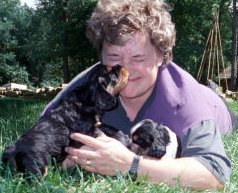
Minor
|
What are English Cockers like?
The English Cocker Spaniel is by breed standard considered a
"merry" dog. They are energetic, boisterous, and
absolutely joyful companions when in the right environment.
|
| They are big enough to not be
fragile, but small enough to be a lapdog, or be picked up and carried
if need be. They are usually very easy-going, and are extremely adaptable.
English Cockers will play and get excited, but are just as good at snuggling up for a good cuddle on the couch.
Very expressive, and smart, they will understand much of what you are telling them, and react accordingly.
English Cockers are loads of fun! They
thrive on attention and love. However, English Cockers are
not a dog for everyone. They would not be the right dog for
someone who wants a part time pet or dog to sit and be quiet all
day while the owner is busy doing other things. If you are a
heavy-handed strict disciplinarian, maybe you should choose
another breed - the English Cocker has a soft personality that
responds poorly to harsh treatment, severe correction, or
screaming and yelling. |
|
Do they need a lot of exercise?
Puppies and younger dogs need plenty of exercise and
stimulation to stay physically healthy and keep out of
mischief. If left to their own devices too often and too
long, any age English Cocker may find
|
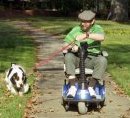
The adaptable
English Cocker
|
| interesting things to do to
entertain themselves! Adults can be great house pets, but still
need walks, playtime and special attention to be happy. |
|
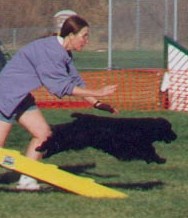
Barra in agility
O'Crowley
|
Are they easy to train?
English Cockers are willing learners and can be trained in
any area and generally are very happy to please. They compete in
breed competitions, obedience, agility, flyball, tracking, working
trials, and other field work. They also can make great therapy
dogs, as they tend to want to love everyone they meet.
|
|
Do they get along with other pets, and
children?
Most English Cockers are great with other pets if introduced
as youngsters and can adapt if introduced slowly as older adults.
The same goes for children or new house members. However,
some do love to chase cats, but many learn to live with them and even love them.
|
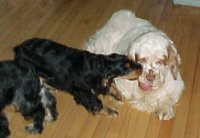
ECS Pup &
Clumber Spaniel
Minor
|
| English Cockers can sometimes be a bit possessive and "growly", but they get over it quickly and are generally very loving. Overall,
most English Cockers enjoy the company of others, be they animals or people. |
|
How long do they live?
Most English Cockers live long and happy lives, many living
12-15 years with proper health care.
|
|
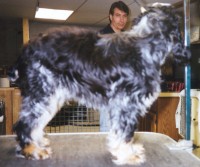
Before grooming,
'Teddy' - Karsch
|
Do they shed a lot of hair?
EC's don't shed much unless they aren't groomed. As long as you keep up with the grooming, they are wonderful! In fact, I have found that we have few allergy problems with them, and several of my family members generally have allergies to dogs.
|
|
Do they need a lot of grooming?
English Cockers are long coated dogs and some grooming is
required even with a pet dog between trips to the groomers (every
4-6 weeks). You will need to plan on keeping up with grooming on a regular basis. Most EC's have quite a bit of hair,
and must be brushed daily to prevent mats on the dog,
and hair from accumulating in your home. This only takes
about 5 minutes.
|
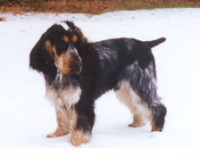
After
grooming
'Teddy' - Karsch
|
| There are different grooming styles, from clippered to stripped on the back coat, to shaving
or thinning much of the "feathers" off for grooming ease. If you can find a groomer that knows
English Cockers, you will be well ahead of the game. Have your breeder help you find a competent groomer, and plan to bring your dog on a regular basis. In between, keep up with his
brushing!
Toenails may need to be clipped between grooming sessions
depending on the dog and the kind of surface it tends to walk on.
This should be relatively easy if introduced in a positive way as
a puppy. . |
|
Do they have a lot of health problems?
Generally, the English Cocker is a healthy breed, however, there are health problems as there are with all breeds of dogs. The most prevalent diseases/problems are ones that can be lived with, but any new owner should know what to
expect.
As
spaniels, with big ears, care needs to be taken to keep ears clean
to avoid infections.
They can have skin problems, which can be helped by a good
diet as well as many topical ointments available in the
marketplace.
Teeth need to be brushed and care needs to be
taken that the lip fold area is kept clean and hair clipped short
to also avoid infections.
The breed has two prominent genetic
problems that your breeder can discuss with you. One is called
PRA/PRCD- (Progressive Retinal Atrophy/Progressive Rod/Cone
Degeneration). This is a recessive gene that causes early
blindness-though the age can vary from early to after 12 years.
Your breeder will know the likelihood of this being a problem with
their puppies. There is a new test that can supposedly identify the "marker" that indicates if a dog is clear, is a carrier, or has this disease. While there is still much research to be done, it is a good starting place, and most breeders are pleased that this marker has been identified. As a potential owner, you can be assured if this dog has two parents that have been identified as
"genetically clear" that your dog will never
go blind from PRA. You should know, however, that very few English
Cockers have been identified as such. On the bright side, not as many dogs actually go blind as the statistics might suggest at this time, so we can only hope that the tests will get more precise in the future. Currently 6% of
English Cockers have actually been diagnosed with this disease. In
this breed it is generally late-onset, which means it can happen as early as 5 years old, and as late as 15. There are different levels of blindness, and in most cases it is very gradual. You might notice cataracts at first (which can be removed to add several years of sight),
night blindness is usually next, followed by a loss of peripheral vision. Eventually the dog may go totally blind. Most
people who have English Cockers that are afflicted with PRA say that they adapt very well, and in most instances you wouldn't even know that they were blind. Because they are so loving, I would expect them to just want to spend more time in their special person's lap.
Another major health concern is FN (Familial
Nephropathy) again, a recessive gene that causes kidney failure at
a young age and your breeder will know the possibility of this
gene being present in their line. Research is underway to help
determine which dogs are carriers or affected, but is not yet
perfected.
As in many dog breeds, there is some hip dysplasia. While it is not that
prevalent among English Cockers, it is there. You should ask your breeder if the parents are listed with OFA (Orthopedic Foundation of America) and what their hip ratings are. While this is not a definitive indicator of whether the pup will develop hip
dysplasia, it is a step in the right direction. If you find that your puppy does have HD, there are
surgical, natural and chemical ways of helping him, so check with your breeder and other
knowledgeable people in the breed.
Another genetic defect to watch for is deafness. While it hasn't been proven that this is
always hereditary, and even dogs that can hear when young can go deaf when older, it is something to ask about. Many breeders have their dogs BAER (brainstem auditory evoked
response) tested to see if their dogs can hear out of both ears. You should ask your breeder how the parents tested. Some breeders will also test puppies before they go to their new homes, although not often.
|
|